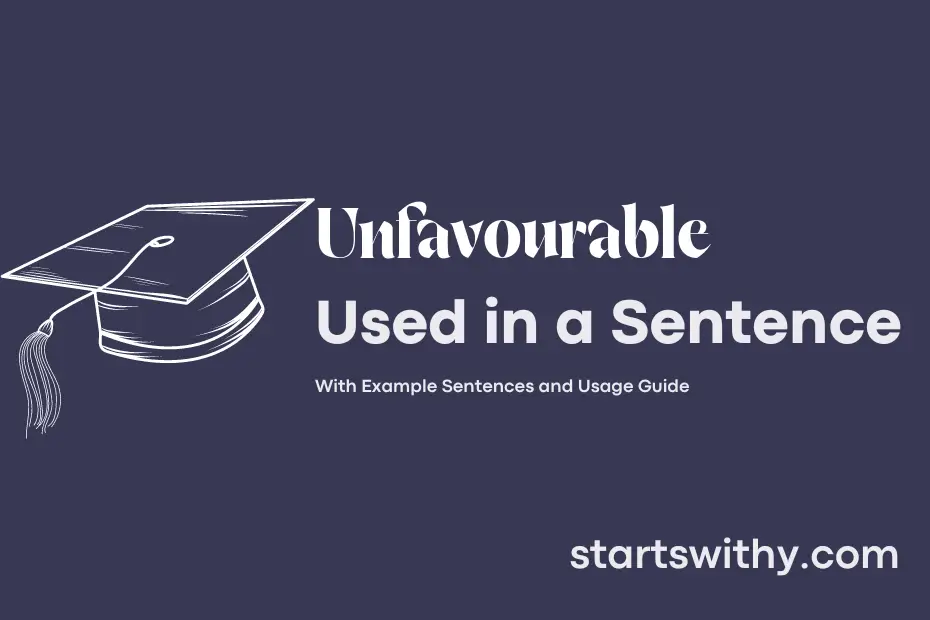Have you ever come across the term “unfavourable”? This word is commonly used to describe something that is not conducive or advantageous. In other words, it refers to situations or circumstances that are unfavorable or less than ideal.
When using “unfavourable” in a sentence, it signifies a negative or undesirable state or condition. It is often employed to emphasize that a particular situation is not in one’s favor or does not meet their expectations. Whether describing unfavorable weather conditions or an unfavorable outcome, this term is a useful way to convey when things are not going well.
7 Examples Of Unfavourable Used In a Sentence For Kids
- Monsoon can bring unfavourable rain and winds.
- Bees can sting you, which is unfavourable.
- Eating too much candy is unfavourable for your teeth.
- Falling down from a tree is unfavourable.
- Not sharing toys is unfavourable behavior.
- Wearing wet clothes can be unfavourable for your health.
- Having a broken toy is unfavourable.
14 Sentences with Unfavourable Examples
- The sudden change in weather resulted in unfavourable conditions for outdoor sports events.
- The frequent power cuts during exams created an unfavourable study environment for students.
- The lack of internship opportunities in the city led to an unfavourable situation for college students seeking work experience.
- Plagiarism can result in unfavourable consequences such as failing a course or even expulsion from the university.
- The unexpected hike in tuition fees put many students in an unfavourable financial situation.
- Not having access to a reliable internet connection can lead to unfavourable outcomes for students during online exams.
- Issues with the hostel sanitation can create an unfavourable living environment for students.
- A sudden change in the exam schedule can have unfavourable effects on students who had already planned their study routine.
- Unfavourable feedback from professors can be disheartening for students who have put in a lot of effort into their assignments.
- Being surrounded by negative influences can lead to an unfavourable impact on a student’s mental health.
- The lack of updated study material can result in unfavourable exam performance for students.
- The delay in receiving scholarship payouts can lead to unfavourable financial constraints for students.
- Not having access to a well-equipped library can create an unfavourable situation for students preparing for exams.
- The limited number of job opportunities on campus can lead to an unfavourable situation for students looking to earn extra income.
How To Use Unfavourable in Sentences?
To Unfavourable is to describe something that is not ideal, disadvantageous, or unfavorable. When using unfavourable in a sentence, it is important to remember that it is the opposite of something that is favorable or advantageous.
Here are some steps to help you use unfavourable effectively in a sentence:
-
Identify a situation or object that you want to describe as not ideal or disadvantageous.
-
Think about how this situation or object does not meet your expectations or is not advantageous in some way.
-
Construct your sentence by using the word Unfavourable in a context that clearly conveys its meaning. For example, “The unfavourable weather conditions forced us to cancel our outdoor picnic.”
-
Make sure the sentence is clear and easy to understand, highlighting why the situation or object is considered unfavourable.
-
Practice using Unfavourable in different sentences to become more comfortable with its usage and to strengthen your vocabulary.
Remember, using unfavourable in a sentence can help you express your thoughts and opinions about a situation that is not in your favor. By following these steps and practicing regularly, you can enhance your writing and communication skills.
Conclusion
In conclusion, sentences with unfavorable meanings express negative or unfavorable sentiments. These sentences can convey disappointment, criticism, or dissatisfaction towards a person, situation, or outcome. By using words and phrases that denote disapproval or disadvantage, such sentences paint a bleak or undesirable picture.
When encountering sentences with unfavorable connotations, it is important to consider the context and underlying emotions. These sentences may highlight areas for improvement, spark discussions on rectifying issues, or serve as warnings to avoid certain actions. Understanding the implications of unfavorable sentences can aid in navigating challenges, fostering constructive dialogue, and ultimately leading to positive outcomes.



